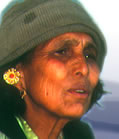THEMES IN THIS
TESTIMONY
Agriculture

Communications

Community Activities

Development

Education

Environment

Family Life

Festivals

Gender

Health

Identity

Social Relationships

Click on arrows
to find more
testimonies
featuring
these themes
|
|
Sex
|
male
|
|
|
Age
|
48
|
|
|
Identity
|
Hindu, Chettri caste
|
|
|
Occupation
|
farmer
|
|
|
Location
|
Thakani VDC, Sindhupalchok
|
|
|
Date
|
1994
|
|
summary
Throughout the testimony, Ram expresses strong convictions about the importance of communal activity and mutual support networks in development. Community decisions are taken at local meetings, with representatives from each household. If he has problems which he cannot manage by himself, he will ask for help from his neighbours – “if they do not help me I will be ruined. So this is a good system. When time comes I will also help them. We have a good cooperation between us”. He notes that “if we work together we will be able to do anything” and “If you spit, it will dry soon. If we all spit together, it will become a sea”. However, he also believes that it is important that a leader takes responsibility for organising community projects. In the case of the local road, which has not yet reached the village, he thinks it is the “fault” of the leader, whose duty it is to organise it – “it is their weakness that they can’t do this work quickly”. The narrator says he is very grateful to ActionAid Nepal for development in the village, which he defines as “... today we have drinking water, hospitals and health posts in our village. That is development.”
detailed breakdown
|
You will need a password from Panos to view the full
transcript of the interview. To apply for a password, click here.
Once you have a password, click here to go to the beginning
of the transcript. You can also click on any section of the
breakdown of content below and go straight to the
corresponding part of the transcript.
|
| Section 1-2 |
Long interesting introductory passage by interviewer (project leader).
Narrator begins by praising AAN activities and feels community has learnt a lot from them: “Today because of this office we learned more things from others, we took training, we talked with people and we got more experiences from them. Today we can decide which is good and which is bad.” Wants expansion of AAN project. Mentions teething difficulties with AAN presence – incomers had to learn to make adjustments.
|
| Section 3 |
Daughter's education cut short so that she could help with household work: “At that time she was small, she could not cut grass. So I admitted her in school. Now she is grown up and able to do work that's why I had to take her out from the school.” Mentions that his family group is nuclear, not extended.
|
| Section 4 |
Discussion of caste limits on marriage. Explains the fact that celebrations (marriage etc.) differ between castes. Interesting quote about customs: "it's our culture, we can't avoid it.” Values the education of his children “because they will not limit themselves only in the fields and crops.”
Discussion of diseases and medical care.
|
| Section 5 |
Suggests that people value the traditional healer and the hospital equally; certain complaints are dealt with by one, others by the other.
Development in agriculture: increased number of crops, and irrigation.
Mentions depletion of the forests and the relationship between the forest, number of livestock and use of animal dung or chemical fertiliser.
Positive comments about the effects of fertiliser.
|
| Section 6 |
Discussion of agricultural work, including mention of mutual help during busy times, and the occasional need to hire agricultural labour.
Points out that in labour exchanges women's work counts for only half the value of men's. (Introduction of wages seems to have formalised this?).
|
| Section 7 |
Passage about how mutual support for other villagers is agreed at meetings.
The system seems to offer individuals security/insurance: “In our village, sometimes neighbours become sick and are not able to help in time, at that time villagers will help them they will cultivate crops in his field and he will pay for their help when he becomes well.”
Talks about the advantages of road links being built, but criticises the slow pace of such developments
|
| Section 8-9 |
Believes that the price of fertiliser (a major concern) depends on the rate of population growth.
Suggests that AAN, not the community, is responsible for decisions about development: “You will think about it – what kind of development we need. You have to decide yourselves.”
|
|


